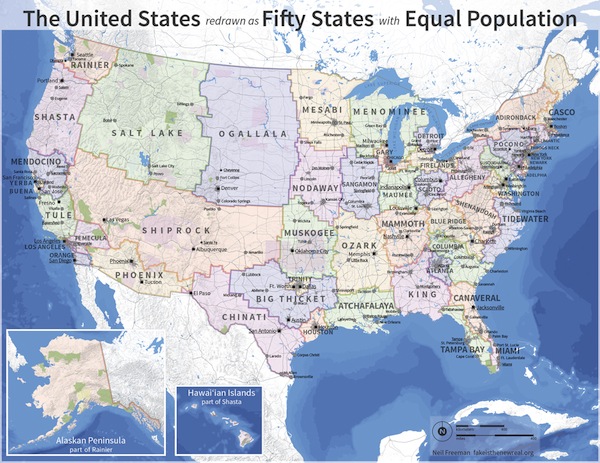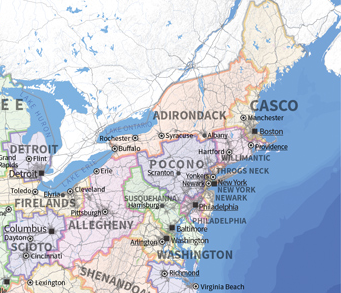We Could Fix the Electoral College (But We’d Have to Give Up Cape Cod)
Plans to resolve the inequities of the Electoral College usually fall into one of two categories: those that seek to eliminate the anachronistic system altogether, and those that seek to change the way a state’s electoral votes are awarded. Neither solution seems likely to move forward any time soon.
So maybe it’s time to start coming up with a new solution. Artist and urban planner Neil Freeman has an interesting one: redivide the United States into 50 new states of roughly equal population. Freeman’s plan, which he unveiled last week, addresses what he says is the Electoral College’s fundamental problem: the current divisions create states that are too disparate in size and influence, giving some states, particularly small ones, more electoral power than others.
Freeman carved up the US map to create 50 new states, each with a population of about 6,175,000. He drew the new borders to reflect the commuting patterns of the people living within them—most of his states are centered on one or two major urban areas—and to correspond with determining geographical features like rivers and mountain ranges.
Map courtesy of Neil Freeman
He then named his new states after them, giving us the states of Atlanta, Detroit, Blue Ridge, and Salt Lake. And to keep things interesting, he named a few of them after people, plants, and songs (giving us the state of Yerba Buena in California and the state of Gary in the area immediately surrounding Chicago).
“A system like the Electoral College that is so insensible and crazy deserves a fix that is a little out there too,” says Freeman.
Under his proposal, Boston would become part of a new state—which Freeman calls Casco, after Casco Bay along Southern Maine—that would include urban New Hampshire and coastal and northern Maine. Massachusetts west of I-495 would become part of Adirondack, which would include most of Upstate New York, Vermont, and eastern New Hampshire. Massachusetts south of the Greater Boston Area would join Rhode Island and Connecticut to form the state of Willimantic.
His plan would obviously make more than a few people unhappy. While most Bostonians wouldn’t be too upset about losing Worcester, they’d probably put up a fight before they let the Cape go (it would become part of Willimantic under Freeman’s proposal). Although Freeman offers some consolation—“think of it less as losing the Cape and more as gaining all those outlet malls in New Hampshire,” he says—it’s unlikely that anyone would accept discount jeans at the Gap Outlet as an adequate substitute for the best beaches in the state. It’s also unlikely that any Mainers would be enthused about finding themselves back under the political control of Bostonians.
Personal gripes aside, Freeman’s plan isn’t a bad one. As Freeman points out on his blog, it would end the over-representation of small states and the under-representation of large states in presidential voting by eliminating small and large states.
Under the current system, each state is allocated electors based on its number of representatives in the house, which is determined by its population. Each state is also allocated an additional two electors to reflect its two senators. Freeman explains that these additional two electors are essentially a “bonus” for small states like Vermont, and that they give small states more electoral power than large, densely populated states like New York. Freeman’s system would eliminate this bonus while preserving the historic structure and function of the Electoral College.
Freeman explicitly says that his plan is an art project, not a serious proposal. And for better or for worse, it’s never going to happen. But his seemingly absurd suggestion is no worse than our current system—in many ways, it’s better—driving home an important point about the efficacy and equity (or lack thereof) of the Electoral College.



